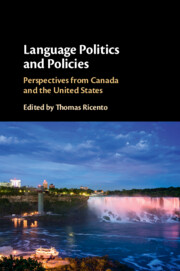Book contents
- Language Politics and Policies
- Language Politics and Policies
- Copyright page
- Dedication
- Contents
- Figures
- Tables
- Contributors
- Preface
- Contributor Personal Statements
- Introduction
- Part I Theoretical Orientations
- 1 The Liberal Tradition in America
- 2 The Political Ethics of Linguistic In-Betweenness
- 3 Alienation, Language Work, and the So-Called Commodification of Language
- 4 Canadian Language Politics in Global and Theoretical Contexts
- Part II The United States Context
- Part III The Canadian Context
- Index
- References
4 - Canadian Language Politics in Global and Theoretical Contexts
from Part I - Theoretical Orientations
Published online by Cambridge University Press: 18 July 2019
- Language Politics and Policies
- Language Politics and Policies
- Copyright page
- Dedication
- Contents
- Figures
- Tables
- Contributors
- Preface
- Contributor Personal Statements
- Introduction
- Part I Theoretical Orientations
- 1 The Liberal Tradition in America
- 2 The Political Ethics of Linguistic In-Betweenness
- 3 Alienation, Language Work, and the So-Called Commodification of Language
- 4 Canadian Language Politics in Global and Theoretical Contexts
- Part II The United States Context
- Part III The Canadian Context
- Index
- References
Summary
This chapter examines the common assumption that Canadian Official Bilingualism of French and English fosters progressive and tolerant multiculturalism, including multilingualism of any non-official variety. The chapter uses the former Commissioner of Official Languages of Canada (2006-16), Graham Fraser, to interrogate the argument that the Canadian English/French language duality, having two Official Languages, is positively connected to general multilingualism and with it an openness towards a multitude of languages and cultures that make up Canadian society. After a shorter discussion of a similar position held by former Chief Justice Beverly McLachlin (2000-17), this chapter turns to the theoretical grounding of such positions in the work of Charles Taylor. Ultimately this chapter questions the extent to which these celebrations of bilingualism really foster a truly multilingual and egalitarian multicultural society, although it appreciates and agrees with their insistence that language and culture are deeply inextricable.
Keywords
- Type
- Chapter
- Information
- Language Politics and PoliciesPerspectives from Canada and the United States, pp. 78 - 94Publisher: Cambridge University PressPrint publication year: 2019

